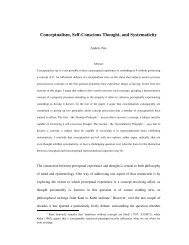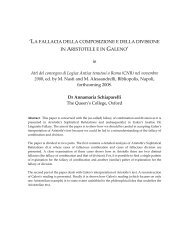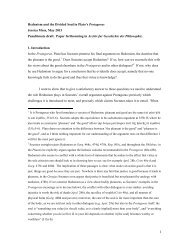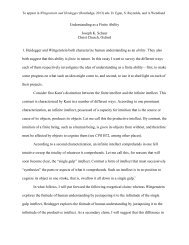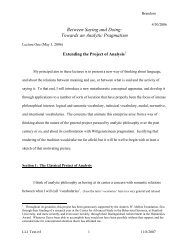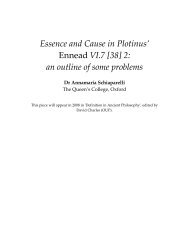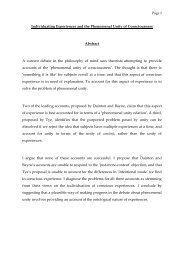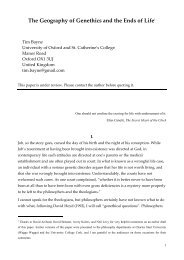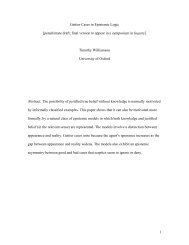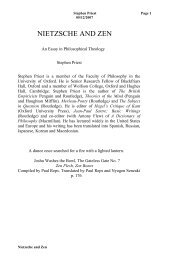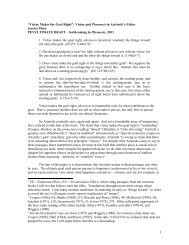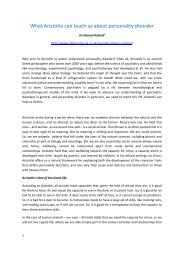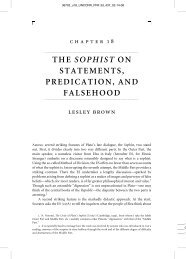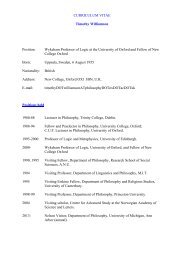de se knowledge and the possibility of an omniscient being
de se knowledge and the possibility of an omniscient being
de se knowledge and the possibility of an omniscient being
Create successful ePaper yourself
Turn your PDF publications into a flip-book with our unique Google optimized e-Paper software.
192 Faith <strong><strong>an</strong>d</strong> Philosophy<br />
some o<strong>the</strong>r individual c<strong>an</strong> know what I know when I come to have <strong>de</strong><br />
<strong>se</strong> <strong>knowledge</strong>. Patrick Grim pre<strong>se</strong>nts <strong>the</strong> difficulty that <strong>de</strong> <strong>se</strong> <strong>knowledge</strong><br />
rai<strong>se</strong>s for omniscience as follows:<br />
In or<strong>de</strong>r to qualify as <strong>omniscient</strong> or all-knowing, a <strong>being</strong> must know<br />
at least all that is known. Such a <strong>being</strong> must, <strong>the</strong>n, know what I know<br />
in knowing [(F)]. . . . But what I know in such a ca<strong>se</strong>, it appears, is<br />
known by no <strong>omniscient</strong> <strong>being</strong>. The in<strong>de</strong>xical ‘I’ . . . is es<strong>se</strong>ntial to<br />
what I know in knowing [(F)]. But only I c<strong>an</strong> u<strong>se</strong> that ‘I’ to in<strong>de</strong>x<br />
me—no <strong>being</strong> distinct from me c<strong>an</strong> do so. I am not <strong>omniscient</strong>. But<br />
<strong>the</strong>re is something that I know that no <strong>being</strong> distinct from me c<strong>an</strong><br />
know. Nei<strong>the</strong>r I nor <strong>an</strong>y <strong>being</strong> distinct from me, <strong>the</strong>n, is <strong>omniscient</strong>:<br />
<strong>the</strong>re is no <strong>omniscient</strong> <strong>being</strong>. 2<br />
Grim’s argument c<strong>an</strong> be restated as follows:<br />
(1) I come to know something, namely (F), when I realize that my hair<br />
is on fire.<br />
(2) No one el<strong>se</strong> c<strong>an</strong> know what I know in knowing (F).<br />
(3) I am not <strong>omniscient</strong>.<br />
(4) If I know something that no one el<strong>se</strong> c<strong>an</strong> know <strong><strong>an</strong>d</strong> I am not <strong>omniscient</strong><br />
<strong>the</strong>n no <strong>being</strong> is <strong>omniscient</strong>.<br />
(5) Therefore, no <strong>being</strong> is <strong>omniscient</strong>.<br />
Given <strong>the</strong> validity <strong>of</strong> Grim’s argument, <strong>the</strong> <strong>de</strong>fen<strong>de</strong>r <strong>of</strong> <strong>the</strong> <strong>possibility</strong> <strong>of</strong><br />
<strong>an</strong> <strong>omniscient</strong> <strong>being</strong> must reject one <strong>of</strong> <strong>the</strong> premi<strong>se</strong>s. The ‘hair-on-fire’ example<br />
above <strong><strong>an</strong>d</strong> o<strong>the</strong>rs like it successfully <strong>de</strong>monstrate that premi<strong>se</strong> (1)<br />
is true: <strong>the</strong>re is something I come to know when I realize that my hair<br />
is on fire. 3 Premi<strong>se</strong> (3) is obvious enough. Premi<strong>se</strong> (4) follows from <strong>the</strong><br />
<strong>de</strong>finition <strong>of</strong> omniscience <strong><strong>an</strong>d</strong> logic. The only premi<strong>se</strong> that <strong>se</strong>ems up for<br />
dispute is premi<strong>se</strong> (2). 4 In this paper, I will explore whe<strong>the</strong>r it is possible<br />
for some individual distinct from my<strong>se</strong>lf to know what I know in knowing<br />
(F). I will consi<strong>de</strong>r two accounts <strong>of</strong> <strong>de</strong> <strong>se</strong> <strong>knowledge</strong>, one involving firstperson<br />
propositions <strong><strong>an</strong>d</strong> <strong>an</strong>o<strong>the</strong>r involving properties. I will conclu<strong>de</strong> that<br />
a <strong>the</strong>ory <strong>of</strong> first-person propositions that allows for <strong>the</strong> falsity <strong>of</strong> premi<strong>se</strong><br />
(2) has unacceptable con<strong>se</strong>quences. I will claim that on <strong>the</strong> properties account,<br />
<strong>the</strong>re are two <strong>se</strong>n<strong>se</strong>s in which someone el<strong>se</strong> c<strong>an</strong> know what I know<br />
in knowing (F): <strong>the</strong> first <strong>se</strong>n<strong>se</strong> does not <strong>of</strong>fer much hope for <strong>the</strong> <strong>possibility</strong><br />
<strong>of</strong> <strong>an</strong> <strong>omniscient</strong> <strong>being</strong>, but <strong>the</strong> <strong>se</strong>cond one does.<br />
II. The First-person Propositions Account<br />
One way <strong>of</strong> un<strong>de</strong>rmining premi<strong>se</strong> (2) is to claim that <strong>de</strong> <strong>se</strong> <strong>knowledge</strong> is<br />
in fact reducible to <strong>de</strong> dicto <strong>knowledge</strong> <strong><strong>an</strong>d</strong> that this <strong>de</strong> dicto <strong>knowledge</strong> is<br />
knowable by <strong>being</strong>s distinct from me. Such <strong>an</strong> approach is adopted by Edward<br />
Wierenga in The Nature <strong>of</strong> God. 5 Wierenga takes as his starting point<br />
Ro<strong>de</strong>rick Chisholm’s account <strong>of</strong> <strong>de</strong> <strong>se</strong> <strong>knowledge</strong> as pre<strong>se</strong>nted in Person <strong><strong>an</strong>d</strong><br />
Object. 6 Chisholm introduces a special notion <strong>of</strong> entailment (I will follow<br />
Wierenga in referring to this special <strong>se</strong>n<strong>se</strong> as ‘entailc’) according to which



